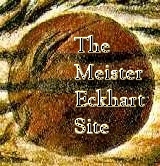|
|
||
 |
Meister Eckhart Home / Works by Meister Eckhart - Quotes / Inspired by Eckhart / Studies / The Papal Condemnation / Mail & Announcements / Links / Books |
Source: W. R. Inge, Light, life and love - Selections from the German Mystics of the Middle Ages, 1904
Page 16
I have spoken quite candidly of the defects of Eckhart's mystical Christianity. As a religious philosophy it does not keep clear of the fallacy that an ascent through the unreal can lead to reality. "To suppose, as the mystic does, that the finite search has of itself no Being at all, is illusory, is Maya, is itself nothing, this is also to deprive the Absolute of even its poor value as a contrasting goal. For a goal that is a goal of no real process has as little value as it has content."[xxiii] But, as Prof. Royce says, mysticism furnishes us with the means of correcting itself. It supplies an obvious reductio ad absurdum of the theory with which it set out, that "Immediacy is the one test of reality," and is itself forced to give the world of diversity a real value as manifesting in different degrees the nature of God. Those who are acquainted with the sacred books of the East will recognise that here is the decisive departure from real Pantheism. And it may be fairly claimed for the German mystics that though their speculative teaching sometimes seems to echo too ominously the apathetic detachment of the Indian sage, their lives and example, and their practical exhortations, preached a truer and a larger philosophy. Eckhart, as we have seen, was a busy preacher as well as a keen student, and some of the younger members of his school were even more occupied in pastoral work. If the tree is to be judged by its fruits, mysticism can give a very good account of itself to the Marthas as well as the Marys of this world.
More studies on Meister Eckhart ||| Eckhart Home